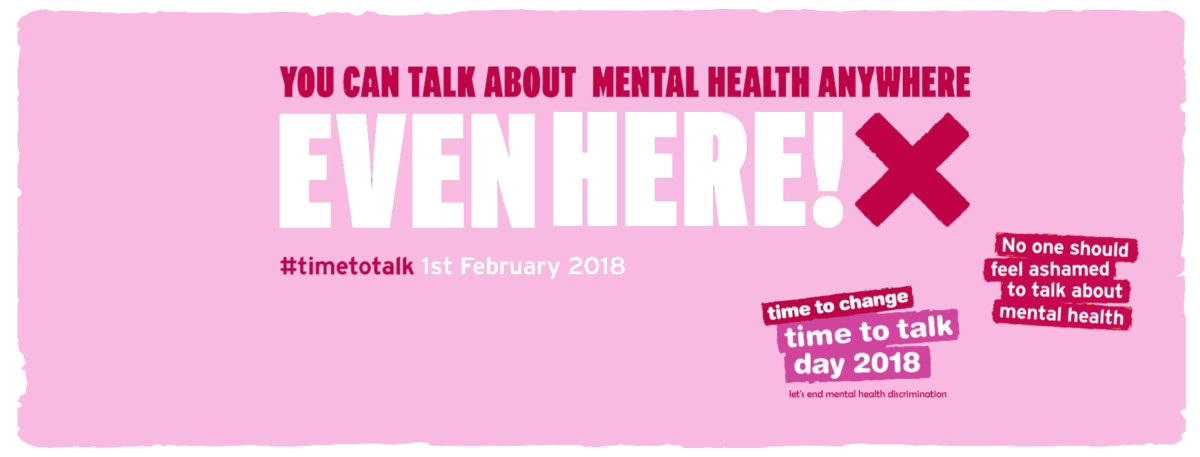Today is Time to Talk Day. It’s a chance for all of us to be more open about mental health – to talk, to listen, to change lives.
Mental illness still has a massive stigma attached to it, which we as a society are hyper-aware of. Personally, I hate talking about my mental health, especially out loud. But what I’ve realised through this blog, is that talking about our own stories can really help other people going through similar situations who feel really alone.
With every conversation I have about my panic disorder and anxiety, I feel more confident, less ashamed and less embarrassed by it. I was so scared to publish my first post on my panic attacks, but I did, and I’ve never looked back since. [Read: My Own Experience of Panic Attacks]
I write about my own mental health, my anxiety and my panic disorder on this blog, but I rarely talk about it out loud. You wouldn’t guess that I have anxiety or panic disorder: I don’t openly talk about it, I don’t look like I have a problem and I hide it well.
It hinders my everyday life and I spend half my time convincing everyone else that it doesn’t. I don’t feel like I have an illness, I just think it’s part of my life which I’ve come to accept and deal with on my own terms.
Admitting out loud that you have a problem feels kind of like you’re declaring you’re weak, and I completely get it – I feel like that – but you are not weak because you have a mental illness. You get up everyday, and continue a battle with your own mind, and that is bloody hard: going through this only makes you such a strong person! You should be proud that you manage to carry on your life and do all the wonderful things, and see all the brilliant people whilst feeling the way you do.
Anxiety and depression aren’t choices or excuses, they aren’t phases or cries for help. They can’t just be switched on and off.
Make someone else aware today and let’s stop the stigma that surrounds mental health.
[Read: We Need To Talk About Mental Health]Talking about mental health doesn’t need to be awkward
We know talking about mental health is not always easy. But starting a conversation doesn’t have to be awkward, and being there for someone can make a huge difference.
There is no right way to talk about mental health. There is no right place either. You can talk about mental health anywhere – at home, at work or up a mountain! The main thing to consider is that the conversation is safe and discreet.
Why it is important to talk about mental health
615 million people worldwide suffer from anxiety or depression
One in four people in the world will be affected by mental or neurological disorders at some point in their lives
Every year in the UK 70 million workdays are lost due to mental illness, including anxiety, depression and stress related conditions. This means mental illness is the leading cause of sickness and absence from work*
Suicide is the leading cause of death in 20-34 year olds in the UK
You could walk past hundreds of people, each day, who suffer from various mental health issues, and you wouldn’t know it. It’s hidden. It’s not visible.
![]()
What you can do on Time To Talk Day, and everyday
#1 Start small
Many people find talking in person intimidating, and that’s understandable. But it doesn’t need to stop you from starting a conversation altogether. You could make a quick phone call, send your best mate a text, or leave a note for a parent.
“It is not the massive gestures or the giant paragraphs that have made the biggest difference, but the little things. It doesn’t take long to send a quick text, but the impact it has is huge. A text from a friend reinforced how I wasn’t alone.”
#2 Find a good time & place
Sometimes it’s easier to talk side by side rather than face to face. So, if you do talk in person, you might want to chat while you are doing something else. You could start a conversation when you’re walking, cooking or stuck in traffic.
“Walking together or sitting driving are both amazing, because the experience of talking to someone whilst you’re side by side can be so much more freeing and less daunting than face to face. The changing scenery helps too.”
#3 Ask questions (gently!)
There are lots of misconceptions around mental illness. That means asking questions can be an important way of learning. Just remember not to get too personal, and be aware if the discussion is making someone feel uncomfortable.
“It is far better to ask people the questions you have outright rather than assuming things. People with a mental health condition can always tell you politely if you’re wrong. If you ask a stupid question, then you can both can laugh later together.”
#4 Be open
Being open and honest with others can help to build trust. For example, you might choose to tell your friend something about you that they may not know. Just remember, don’t feel pressure to share anything that you are not comfortable with.
“It doesn’t have to be anything major – but being a bit more open about things, especially as a man, can often encourage a good friend to do the same.”
#5 Treat them the same
When someone is diagnosed with a mental illness, they’re still the same person as they were before. And that means when a friend or loved one opens up about mental health, they don’t want to be treated any differently. If you want to support them, keep it simple. Do the things you’d normally do.
It’s Time To Talk Day, encouraging people to talk about mental health anywhere, at any time, in any way that feels safe to you. If you’re struggling, you may find it easier to talk to your GP, or call Mind on 0300 123 3393, or The Samaritans on 116 123.
* Statistics from the Mental Health Foundation



